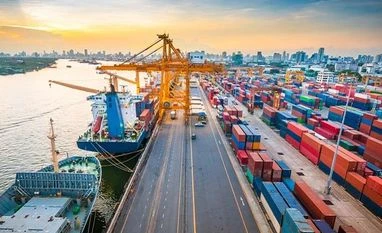A new tax refund scheme announced by Finance Minister Nirmala Sitharaman on Saturday will replace the current one, compliant with World Trade Organization (WTO). This removes uncertainty over taxes on outbound shipments and was welcomed by exporters.
“The new scheme is attractive as it will neutralise all duties and levies,” said Sharad Kumar Saraf, president of the Federation of Indian Export Organisations.
From the next year, the Remission of Duties or Taxes on Export Products (RoDTEP) will replace the Merchandise Exports from India Scheme (MEIS) for all exported goods except textiles.
Saraf said giving a three-month notice for the roll-out of the scheme will put all uncertainty to rest.
Introduced in 2015, under the Foreign Trade Policy, the MEIS incentivises merchandise exports of more than 8,000 items. This is the biggest scheme of its kind.
Exporters earn duty credits at fixed rates of 2 per cent, 3 per cent, and 5 per cent, depending upon the product and target country. Officials said the RoDTEP will also be based on this method, but the rates are yet to be decided.
Mahesh Jaising, partner, Deloitte India, said, “The important lookout is the quantum of benefit in key sectors. This will determine the actual impact of the new scheme vis-à-vis the MEIS.”
A commerce department official said apart from boosting exports, the scheme was also needed to break a major deadlock at the WTO.
“The RoDTEP gives us a leeway at the WTO, since other economies like Brazil have also done it. The new one will help reduce post-production transaction costs,” said Sachin Chaturvedi, director-general of RIS, a foreign trade think tank.
In March, the US had targeted the MEIS and other export-promotion schemes of India, arguing that New Delhi had been misusing export subsidies to get an unfair advantage. WTO rules prohibit India from expanding these schemes. India contested the charges, though it was opposed by an 11-nation coalition.
Since 2018, the commerce department has been working on a production-based scheme. Experts said a remission-based scheme will help at the WTO.
The government has also announced an electronic-refund model for quick and automatic disbursal of input tax credit refunds for exporters, set to go live by the end of the month.
“This has remained a prime concern among small businesses. This will reduce the lock up of funds. But the speed of other payments, especially that of the Rs 7,000-crore worth of unpaid payments to MSMEs (micro, small and medium enterprises) need to go up,” said the Federation of Indian Micro and Small & Medium Enterprises in a statement.
The government will now also foot a bill of Rs 1,700 crore annually to provide higher insurance cover for exporters through the Export Credit Guarantee Corporation.
Besides this, updated priority sector lending norms will make an additional Rs 36,000 crore to Rs 68,000 crore available to banks for lending to exporters. The government hopes these interventions will ensure that foreign and rupee export credit interest rates will be below 4 per cent and 8 per cent, respectively, and increase credit availability.
Earlier, the government had also proposed to increase interest subvention to 5 per cent from 3 per cent or exports.
However, experts caution about the impact of these schemes on exports.
“Priority-sector status to exports will provide some relief to exporters, at the same time proposal of increasing interest subvention to 5 per cent will give some competitive advantage. However, it is unlikely to have a significant impact on export growth, which responds more to global demand,” said Devendra Kumar Pant, chief economist at India Ratings.
Unlock 30+ premium stories daily hand-picked by our editors, across devices on browser and app.
Pick your 5 favourite companies, get a daily email with all news updates on them.
Full access to our intuitive epaper - clip, save, share articles from any device; newspaper archives from 2006.
Preferential invites to Business Standard events.
Curated newsletters on markets, personal finance, policy & politics, start-ups, technology, and more.
)